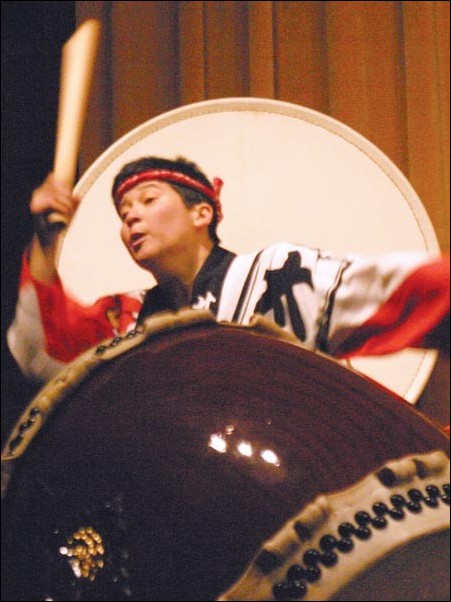March highlights womens’ issues
Image: March highlights womens’ issues:Tiffany Tamarbuchi, a Sac State alumna, leads the Japanese all-women drum group in a February festival.:Andrew Nixon/State Hornet
March 9, 2005
Bellowing beats bouncing off the walls of the University Union’s Redwood Room kicked off the month-long reflection on women’s struggle to overcome gender inequality and oppression.
Large, brightly colored drums introduced Sacramento State’s Women’s History Month, which runs throughout March, featuring several events that range from a Japanese cultural drumming performance to a discussion on the popular American television drama series, Desperate Housewives.
Unique Programs helped bring the Taiko Dan Drummers from Sacramento to campus at noon on Wednesday to express women’s empowerment through musical art.
Tiffany Tamaribuchi, the drummers’ leader, is a Sac State alumna. Tamaribuchi graduated in 1993 with a bachelor’s degree in psychology and has been drumming with the Japanese all-woman group since 1988, when she first performed at Sac State for that year’s campus recognition of women’s history.
Seven members of the eight-member group graduated from Sac State.
For Tamaribuchi, her drums play an important role in this month’s theme.
We get to break some stereotypes about Japanese and women with our strong and powerful performance, Tamaribuchi said.
She said her group had been pleased with the crowd and the students’ enthusiasm for the drumming concert.
That enthusiasm is what Patricia Grady, coordinator for the Women’s Resource Center that is sponsoring the Women’s History Month events, said she hopes will stay consistent throughout the month as several campus organizations and individuals put on events that remember, appreciate and support a more equal society for women.
Grady said she wants March to raise awareness of the progress women have made and the issues they are currently facing.
Another highlight in this month’s focus on women is the Vagina Monologues film, Until the Violence Stops, Grady said.
Supported by the Multicultural Center, the film will show the history behind the Vagina Monologues.
The film is based on Eve Ensler, a sexual assault survivor and creator of the famous play that was released in 1998.
Valdez said the money generated from the Vagina Monologues, which Ensler has allowed college campuses to perform for free, goes towards international support for women.
Some of the money purchased a Jeep that Ensler used to drive around Africa, helping women to avoid their culture’s practice of genital mutilation.
The women were provided with a safe house where they could seek refuge.
As a man, it is important for those of us with wives, daughters and mothers to understand the impact (the film) has on everyone, Valdez said.
In American culture, the media have been rife with stereotypes that are oftentimes negative, said Timi Poeppelman, a part-time instructor in the communications department.
Poeppelman developed the idea of holding a panel discussion on the popular television show, Desperate Housewives, that will focus on the media’s images of motherhood and is supported by Unique Programs and the Communications Department.
(The show) is pushing the envelope, said Poeppleman, who records the show every week to analyze it, highlighting lines that every once in a while resist society’s stereotypes of women.
For example, when the character, Gabriel, said her uterus was not up for negotiation, it broke the stereotype that all women should be mothers, Poeppelman said.
Society thinks something is wrong if you are not a mom, she said.
For more information about Women’s History Month events, call the Women’s Resource Center at 278-7388.
Sarah Pollo can be reached at [email protected]

























































































































